May 27, 2023
By Fr. Matt Keller, C.PP.S.
There is a story of a little boy and his grandmother having a conversation and the little boy said “Grandma, I know what happened at Pentecost.” The grandmother said, “What happened at Pentecost?” He said, “It was when Jesus came to set them on fire and then they were no longer afraid.”
This little boy’s answer is cute but also in cute way he is right. When we think of Pentecost, we think of the strong driving wind, the tongues of fire, and the apostles speaking in various languages that whole crowd understood as if they were speaking in their own native language. These were “the mighty acts of God”’ (Acts 2: 11). And after this event, the disciples went out spreading the message of Jesus. Jesus set them on fire.
But what we can so easily forget is that prior to this event of Pentecost, the Apostles were afraid, and they were also experiencing mixture of other emotions. We hear in our scriptures today that the apostles were hiding behind locked doors. And their fear, you could argue, was reasonable. Jesus, their leader and close friend, was convicted and put to death. Because of their association with him, the religious leaders could be coming for them next.
The apostles were also experiencing grief and regret. They had told Jesus they would be there for him, but when the authorities came for Jesus, his disciples fled in fear. Yet it is amid this fear and mixture of emotions, that Jesus appears and brings them his peace and breathes the Holy Spirit on them. They were, as the little boy said, set on fire. Receiving the Holy Spirit strengthened them so that they could share the message of Jesus with the world.
Today as a Church, we officially draw Easter Season to close. After today, the Easter candle will exit its prominent place in the sanctuary and we will return to Ordinary time. Throughout this Easter Season, we have been reading from the Acts of the Apostles and how the Holy Spirit worked in the lives of the apostles, how the Holy Spirit set the apostles on fire, and we learn how this fire caused the Church to grow.
The Holy Spirit set the apostles on fire, and Holy Spirit has the tendency to set our lives on fire as well. And when Jesus sets us on fire, it springs us into action. Nearly five years ago when I was ordained priest, I selected this passage to read because I knew in order for me to be the best priest I can be, I needed that breath, that fire of the Holy Spirit on my life. Bishop Joseph Charron, C.PP.S., invoked the Holy Spirit upon me as he laid hands on me. In his homily, he said that he prayed the Holy Spirit would come upon my life in a powerful way. As I think of all that I have experienced as priest, it has been the effect of the Holy Spirit, setting my life on fire, springing me into action, the work of God at work in my life.
We are in the season of graduations and we are grateful for what graduates have accomplished. But I am also excited for our graduates in how the Holy Spirit will set their hearts on fire as they set out to accomplish their goals and dreams. As we celebrate Pentecost today, may the Lord set our hearts and lives on fire to spring us into action to do his work.
To view the full scripture reading, click here.

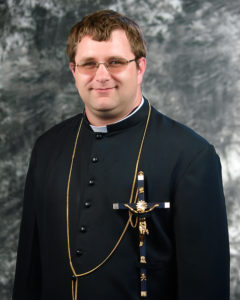
Fr. Matt Keller, C.PP.S., is the pastor of St. John the Baptist Church in Glandorf, Ohio.
May 23, 2023
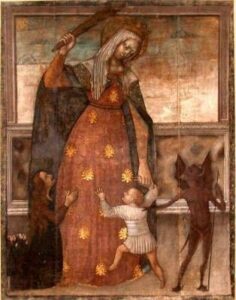
This image of Our Lady of the Stick can be found at the Abbey of San Felice in Giano, Italy, where the Missionaries were founded in 1815.
By Fr. Steve Dos Santos, C.PP.S.
The celebration of Mary Help of Christians was instituted by Pope Pius VII in 1815, a year after his triumphal return to Rome from exile under Napoleon. Our founder, St. Gaspar del Bufalo, named her patroness of our Congregation because of the difficult mission that lay before the Missionaries. St. Maria de Mattias, who founded the Adorers of the Blood of Christ, also had a particular love for Mary under this title.
While the image above is not technically Mary, Help of Christians, it is one of my favorite images of Mary. I associate it with this feast because of the way children run to her for protection, and the way in which she so forcefully fights off the devil in order to protect them. In it we see Mary defending her children, the way a mother bear might defend its cubs.
In the first reading, John tells us that “the dragon became angry with the woman and went off to wage war against the rest of her offspring” (Rev 12: 17). The passage takes place in the midst of the spiritual battle between the forces of heaven and hell. We often forget about the spiritual world, and the battle that is constantly going on all around us. This feast reminds us that Mary is not a passive observer of this battle. She too takes up arms to defend us from the Evil One and his minions.
The Gospel for this feast is the story of the wedding feast at Cana. On the surface, this story is about the provision of choice wine and the evasion of embarrassment. But the miracle is deeper than just the provision of earthly needs. The wine in its abundance stands as the icon of God’s abundant grace. God is more than just a heavenly ATM doling out our earthly needs.
Mary’s words to the servants, “Do whatever he tells you,” are spoken also to us. Whatever our need, whatever our closeness to her son, she bids us listen to him and follow his instructions. In this single direction is the core of the Christian life. Mary bids us to follow the direction of her son, and therein lies an abundance of grace waiting for us.
Mary is the Help of Christians. We can always turn to her. She stands as intercessor for us, offering her prayers in support of our struggles. But she desires more for us than just plenty of wine and a good name. She desires our salvation and always stands ready to help us with her intercession, and when we need it, her stick to fend off the devil.

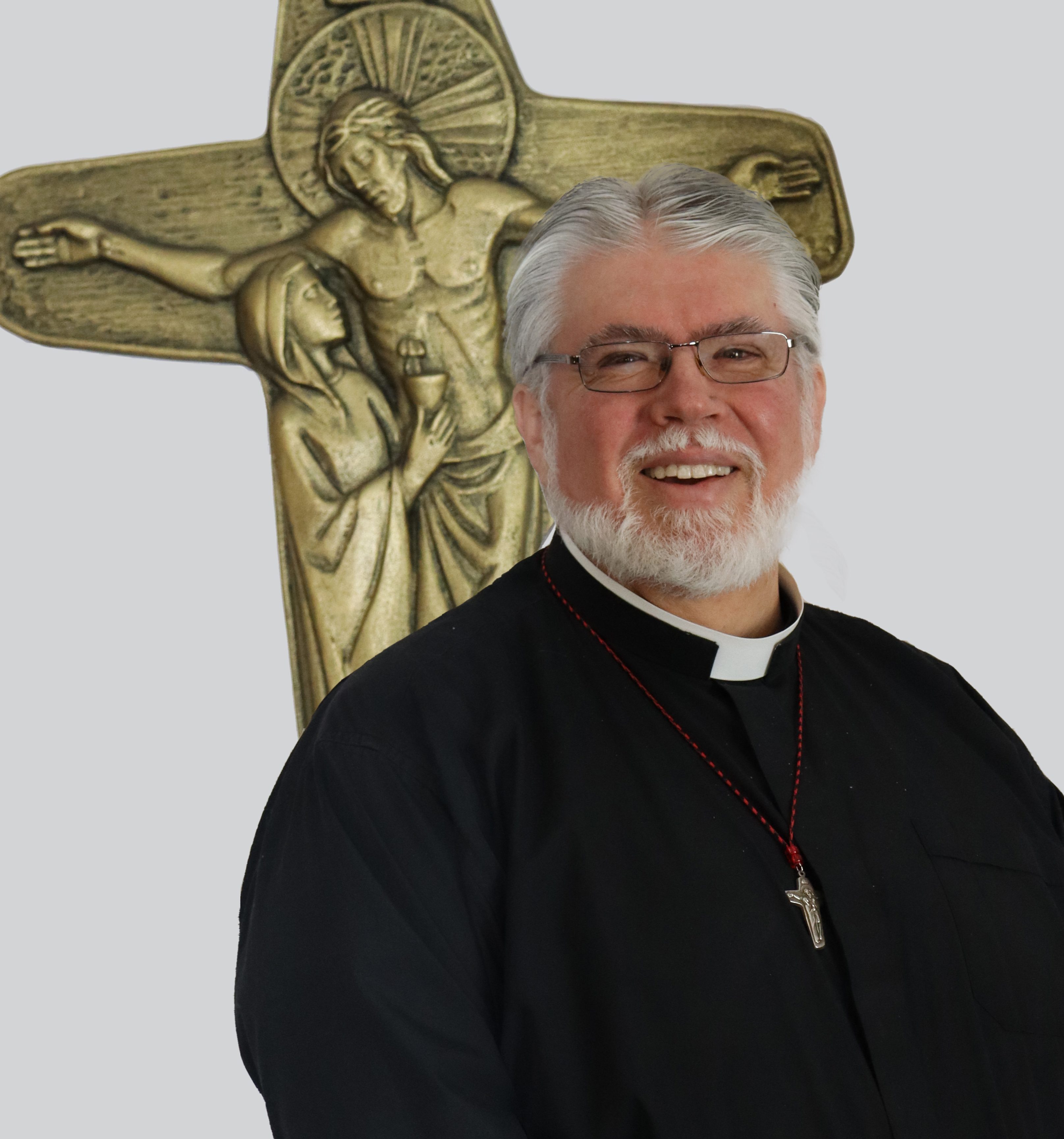
Originally from Alameda, Calif., Fr. Steve Dos Santos, C.PP.S., served for a number of years at St. Agnes Parish in Los Angeles. He is now the vocation director of the Missionaries of the Precious Blood.
May 20, 2023
By Fr. Tony Fortman, C.PP.S.
Today we celebrate the ascension of the Lord. Jesus ascended into heaven body and soul in the presence of the Blessed Virgin Mary and his apostles. This is not the first time Jesus was suspended in the air. If we go back to the transfiguration, we see that Jesus was suspended in the air when he was talking to Moses and Elijah.
Many of us may think that supernatural experiences are not needed to needed to inspire our faith. That is true. Jesus said blessed are those who do not see but still believe. Yet we have the Eucharist change into real flesh and precious blood. As Christians, it is not necessary for us to have supernatural experiences, but God still chooses to work in that realm. We do believe a miracle takes place at every Eucharistic celebration. I do believe in the true presence of Jesus in the Eucharist. To me, the miracle is that the body and blood of Jesus continues to look like bread and wine. Because I know it’s the body and blood of Jesus.
To be honest, I have not had a lot of supernatural experiences. When I was visiting in our parishes in Lima, Perú in 1999, I was being shown around by a fellow C.PP.S. seminarian, Emanuele Lupi. He was later ordained and is now serving as our moderator general—but during that trip to Peru, where he was in ministry, he introduced me to a lady who was a teacher.
Nine years later, I was at Medjugorje when the same teacher approached me, although she did not know it was me. She asked me a question about faith. By then I had been ordained and was dressed as a priest. The miracle was that this lady teacher was from South America and I met her again in Eastern Europe nine years later.
On this solemnity of the Ascension of the Lord, our hope is that our souls will ascend to heaven someday. We read in Scripture, “Our citizenship is in heaven and from it we await a savior.” This world is a testing ground.
Everything that happened to Jesus will happen to us. We will experience joy, pain, betrayal and new life. You and I are called to extend the mission of Jesus. Jesus ascended into heaven and is interceding for us to continue his mission. Let us give all we have to extend the reign of God. Glory to the Blood of Jesus, now and forever.

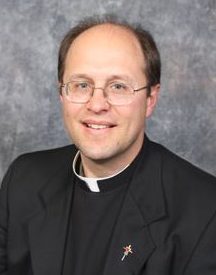
Fr. Tony Fortman, C.PP.S., is the pastor of the three parishes in the Catholic Communities of Northwest Dayton, Precious Blood, St. Paul and St. Rita.
May 13, 2023
Sr. Joyce Ann Zimmerman, CPPS
The Gospel readings for the eight Sundays of Easter are an awe-inspiring movement from Jesus to us. The first three Sundays focus on the risen Christ and proclaim his appearances to the disciples. The Fourth Sunday of Easter reassures us that Jesus, the Good Shepherd, will always remain with us and care for us.
However, when we come to the last three Sundays before Pentecost, there is a shift in time, place and person. Instead of encountering the risen Christ, these Sundays move to Jesus’s farewell discourse to the disciples at the Last Supper, and shift in person from Jesus to us, preparing us for Pentecost Sunday and the descent of the Holy Spirit. These Sundays challenge us to take up Jesus’ saving, loving mission as his faithful disciples.
This Sunday’s Gospel begins with Jesus stating “If you love me … ” If implies a free choice. Jesus does not force us to love him or his Father. We choose to love God and each other because that love establishes a unique relationship opening us to the Holy Spirit dwelling within each of us. It is a relationship that promises us a share in the same risen life that Jesus has been given by his Father and that binds us to God and each other in a marvelously intimate way.
So, while if implies a choice, why would we not make the choice to love God and each other? The benefits—especially the promise of eternal life—far outweigh the cost! The more we grow in our love for God and each other, the easier it becomes to keep God’s commandments and be faithful to God’s will. Jesus’ love for us promises that he will not leave us orphans and so we can be confident to whom we belong. We can be confident of the loving relationship that Jesus extends to us. We can be confident that our love draws us deeper and deeper into the mystery of God’s life and love that is so freely and lavishly given to us.
At the Last Supper, knowing full well the ordeal of suffering that he would soon undergo, Jesus’ heart was turned to his disciples: instructing them, offering them hope, loving them with all his very self could give. Yet, freely choosing to love God and others can have a cost. The cost to Jesus was to be nailed to a cross. The cost to us is to be nailed to the Gospel, living the kind of love that Jesus showed us in his life and ministry. Let us love one another as Jesus loves us: totally, freely, life-giving. If we love God and others? How can we not?

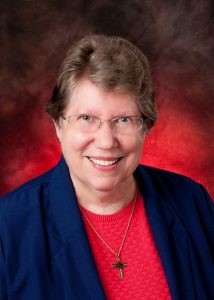
Sr. Joyce Ann Zimmerman, C.PP.S. is the director of the Institute for Liturgical Ministry in Dayton, Ohio.
Apr 22, 2023
By Fr. Jeffrey Kirch, C.PP.S.
The “Journey to Emmaus” is one of the most well-known stories in the New Testament. It is a vivid story that we can truly connect with. Two downtrodden disciples leaving Jerusalem…an encounter with a stranger to whom the disciples tell the story of Jesus’ death…the stranger relating to the disciples the whole of salvation history…and the climax of recognizing Jesus in the breaking of the bread. It is truly a powerful passage.
As a homilist, I’ve reflected and preached on this passage numerous times. Each time I highlight a different aspect of the story. Sometimes it is the recognition of Christ in the breaking of the bread, sometimes it is the burning of the disciples’ hearts. Sometimes, my mind is drawn to the image of the “journey on the road.” The two disciples are leaving Jerusalem and traveling to Emmaus. They are going from one place to another place.
So many stories in Scripture involve a journey. Movement is a vital component of our spiritual life. Scripture is loaded with stories of journeys: Abraham, Moses, Joseph, the journey that led to the Nativity, Jesus’ journey up to Jerusalem, the journey of the first apostles, and the journeys of Paul.
And think about all the journeys we take in our faith, such as the annual journeys of Lent and Advent. There is the journey of coming to faith through RCIA. The formation journey that we all are on, as we move into a deeper and deeper relationship with our God.
The concept of “journey” is rooted in our faith, in part, because we associate it with the idea of progress. As Christians we are on a journey to God. That is what we are doing here on earth. While on the journey we strive to build up the Kingdom of God. As we progress, we grow closer and closer to God. As St. Thomas Aquinas taught, we come from God and we return to God. Fundamentally, life is that journey.
Thankfully, like the disciples on the road to Emmaus, we do not make this journey alone. We are joined by others who help us when we stumble or take a wrong turn. But most importantly, we are joined by Christ. The First Letter of St. Peter directs us to “conduct yourselves with reverence during the time of your sojourning, realizing that you were ransomed from your futile conduct, handed on by your ancestors, not with perishable things like silver or gold but with the precious blood of Christ as of a spotless unblemished lamb.”
Our journey continues. Through our redemption in the Precious Blood of Christ, we pray it brings us ever closer to God.
This reflection by Fr. Jeff Kirch, C.PP.S., was originally shared in 2020.


The V. Rev. Jeffrey Kirch, C.PP.S., is the provincial director of the United States Province. Previously, he served as the secretary general of the worldwide Congregation and was also in ministry at Saint Joseph’s College in Rensselaer, Ind., of which he is an alumnus.
Apr 15, 2023
By Fr. Bill Nordenbrock, C.PP.S.
The first time that I preached on the Gospel account of the appearances of the Resurrected Christ to the disciples was the day after my ordination. As I reflected on this narrative then, what caught my attention was that Jesus needed to make a repeat appearance. At the Easter appearance Jesus had given the disciples his peace and his mission, but one week later the disciples were still locked away in hiding. What happened? Weren’t the disciples paying attention?
It seems that even the appearance of the Resurrected Christ was not enough for the disciples to put fear aside and to become missionary. So in my first Mass homily, I shared my prayerful hope that with the grace of God, my priesthood would be lived outside the safety of sanctuaries.
Forty years later, the context of my life has changed, and a different revelation speaks to my heart. Part of that changed context is since 2000, the Second Sunday of Easter has been designated Divine Mercy Sunday.
Recently I read a meditation that described God as being “mercy, wrapped in mercy, wrapped in mercy.” What a powerful statement about our God! This is the identity of God that is proclaimed in the second reading: “Blessed be the God and Father of our Lord Jesus Christ, who in God’s great mercy gave us a new birth to a living hope through the resurrection of Jesus Christ from the dead . . . ”
The paschal mystery is the revelation and gift of God’s mercy. The life blood poured out on the cross was the mercy of God drenching all people. And the Resurrected Christ returned to his disciples to make sure that they got the message and the command to share that message with the world.
The mercy of God changes our lives; changes who we are. We become hope-filled missionaries carrying God’s mercy to all. If we are paying attention. If we have heard the promise often enough for the gift of mercy to be more than a gift from God, but also a commission to bear the Good News as a gift to be given to others.
In one of my favorite Scripture passages, St. Paul repeats this message. About the paschal mystery, he wrote: “All this has been done by God, who has reconciled us to himself through Christ and has given us the ministry of reconciliation” (2Cor 5:18).
Today we hear again that the mercy of God has been given to us. Again and again, this is the story of God’s unfailing and unconditional love for us. So, let’s stop being afraid. Let us hear the Good News that seeks to transform our lives and accept the commission that sends us into the world to live lives that give witness to God’s mercy.
As I often proclaim in the dismissal rite when celebrating the Sacrament of Penance: Your sins have been forgiven. Go forth in peace and forgive others.

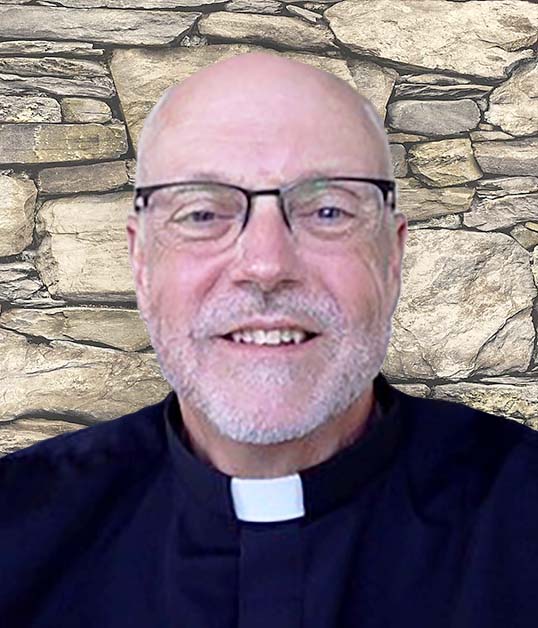
A former moderator general of the worldwide congregation, Fr. Bill Nordenbrock, C.PP.S., resides in Chicago. He serves as the provincial secretary and treasurer of the United States Province.
![]()







